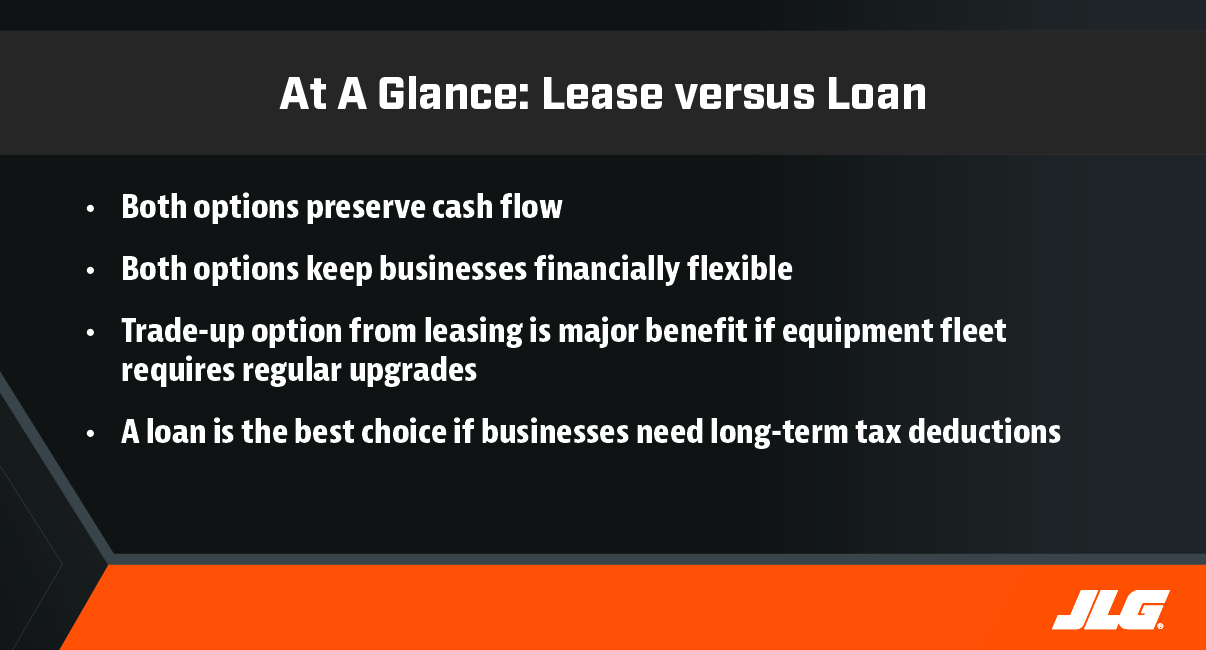You’ve done your research and you’ve made the decision to finance your next equipment acquisition.
Now you’re wondering if you should enter into an equipment lease or a loan.

CWB National Leasing, the funding partner for JLG Financial™ in Canada, says both options offer the advantages of financing but each decision has its own financial nuances that affect your business’s finances differently. Use the comparisons below to learn the differences between the two so you can make an educated decision.
How do my payments affect financing?
Lease: Lease payments either act as rental payments through an operating lease or repayments with interest through a capital lease.
Loan: Your payments are repayments with interest that reduce the principal of your loan.
Will I own the equipment?
Lease: The leasing company owns the equipment during the lease and you pay the equivalent to rental payments; however, most leasing companies provide the option to purchase the equipment at the end of the lease term.
Loan: During a loan, you assume all ownership responsibility of your equipment.
Will I need to make a down payment?
Lease: No down payment is usually required.
Loan: Loans usually requires a down payment. You’ll then finance the remaining equipment cost.
How frequently do I pay?
Lease: You can usually structure your payments to match your cash flow with monthly, seasonal, semi-annual or annual payments.
Loan: You’ll generally pay monthly but depending on the flexibility of your financial institution, you may structure your payments to better match your cash flow.
Will I need to pledge any collateral?
Lease: A lease usually requires no collateral since the equipment leased serves as collateral.
Loan: Depending on your credit, you may need to pledge other assets as collateral before securing financing.
How does my equipment depreciate and what are its tax implications? *
Lease: With an operating lease, you’ll make the equivalent of rental payments for your equipment and you can write off the full portion of your lease payments as an expense. With a capital lease, you’ll assume liabilities of ownership for accounting purposes; however, you can likely deduct the full amount of your lease payments.
Loan: You’ll claim tax deductions for the interest paid on your loan and, since you own the equipment, you’ll amortize the equipment over its useful life. This means you’ll write off the annual amortization based on the equipment’s Capital Cost Allowance.
*Consult your accountant to learn more about your tax position.
What happens if my equipment becomes obsolete?
Lease: You can regularly trade up your equipment at the end of your lease and structure new financing. Sometimes, it’s even possible to refinance a trade up during your lease, protecting you from your equipment becoming outdated.
Loan: Because you assume full ownership with a loan, you’re left with the equipment and bear the risk of obsolescence.
Does this affect my line of credit?
Lease: Leasing preserves your line of credit for other opportunities.
Loan: You may increase your credit exposure if you secure your loan at the same institution where you hold your line of credit.
Should your business lease or loan?
Both options will preserve your cash flow and keep your business financially flexible but your business’s financial situation and equipment needs will determine which choice is right for you. If your equipment requires regular upgrades, the trade-up option from leasing is a major benefit. If you prefer tax deductions in the long run, rather than in the short term with leasing, a loan is your best choice.
Still unsure which option is right for you? To get answers to your finance questions, click here.
Do you want to stay up to date with industry news and issues similar to this? Make sure you subscribe below to receive monthly updates from #DirectAccess with newly posted content so you never miss important information.